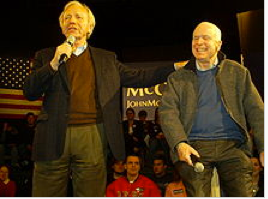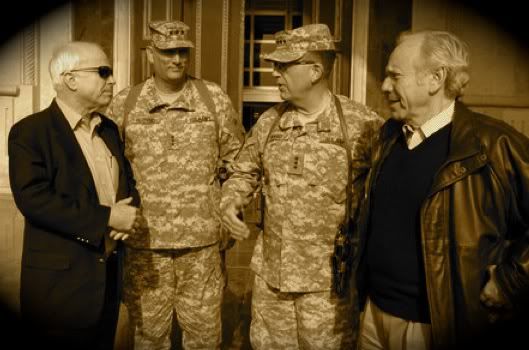You’d think a terrorist organization would welcome being responsible for terrorist attacks, wouldn’t you?
In fact, don’t terrorist organizations often claim responsibility for incidents that they had nothing to do with? Isn’t that how they gain cred? Isn’t their whole purpose of being to create “terror”?
Then why would the Taliban disvow responsibility for the recent attacks in Pakistan?
Taliban: Blackwater to blame for Pakistan attacks
The Pakistani arm of the Taliban has denied responsibility for a recent series of terrorist attacks in Pakistan, instead pointing the finger at Xe Services, the security contractor formerly known as Blackwater, as well as the country’s own security services.
“The Tehreek-e-Taliban are not responsible for the bombings, but Blackwater and Pakistan’s spy agency are behind them,” said Pakistani Taliban spokesman Azam Tariq, according to a translation from Al-Jazeera English.
”The dirty Pakistani intelligence agencies, for the sake of creating mistrust and hatred among people against the Taliban, are carrying out blasts at places like the Islamic university, Islamabad, and the Khyber bazaar, Peshawar,” the Associated Press quoted Tariq as saying.
Just to refresh people’s memories, or maybe to inform them for the first time, there has been a long, incestuous relationship between Pakistan’s secret police, the ISI, and the Taliban. In fact, the Taliban would not have survived, or possibly even existed, without the support of the ISI over the years.
Also, there is a great deal of evidence that the ISI is, and has been, responsible for a great deal of “Islamic terrorism” over the years, and were even directly involved in 9/11:
The Pakistan connection — There is evidence of foreign intelligence backing for the 9/11 hijackers. Why is the US government so keen to cover it up?
Omar Sheikh, a British-born Islamist militant, is waiting to be hanged in Pakistan for a murder he almost certainly didn’t commit – of the Wall Street Journal reporter Daniel Pearl in 2002. Both the US government and Pearl’s wife have since acknowledged that Sheikh was not responsible. Yet the Pakistani government is refusing to try other suspects newly implicated in Pearl’s kidnap and murder for fear the evidence they produce in court might acquit Sheikh and reveal too much.
Significantly, Sheikh is also the man who, on the instructions of General Mahmoud Ahmed, the then head of Pakistan’s Inter-Services Intelligence (ISI), wired $100,000 before the 9/11 attacks to Mohammed Atta, the lead hijacker. It is extraordinary that neither Ahmed nor Sheikh have been charged and brought to trial on this count. Why not?
Ahmed, the paymaster for the hijackers, was actually in Washington on 9/11, and had a series of pre-9/11 top-level meetings in the White House, the Pentagon, the national security council, and with George Tenet, then head of the CIA, and Marc Grossman, the under-secretary of state for political affairs. When Ahmed was exposed by the Wall Street Journal as having sent the money to the hijackers, he was forced to “retire” by President Pervez Musharraf. Why hasn’t the US demanded that he be questioned and tried in court?
You can easily look up the history of the ISI as it relates to the very existence of the Taliban and “Al Queda”.
Well, interestingly enough, just yesterday the LA Times published an article about how our very own CIA has funded the ISI over the years. And I mean funded it.
CIA says it gets its money’s worth from Pakistani spy agency
It has given hundreds of millions to the ISI, for operations as well as rewards for the capture or death of terrorist suspects. Despite fears of corruption, it is money well-spent, ex-officials say.
The CIA has funneled hundreds of millions of dollars to Pakistan’s intelligence service since the Sept. 11 attacks, accounting for as much as one-third of the foreign spy agency’s annual budget, current and former U.S. officials say.
The Inter-Services Intelligence agency also has collected tens of millions of dollars through a classified CIA program that pays for the capture or killing of wanted militants, a clandestine counterpart to the rewards publicly offered by the State Department, officials said.
The payments have triggered intense debate within the U.S. government, officials said, because of long-standing suspicions that the ISI continues to help Taliban extremists who undermine U.S. efforts in Afghanistan and provide sanctuary to Al Qaeda members in Pakistan.
But U.S. officials have continued the funding because the ISI’s assistance is considered crucial: Almost every major terrorist plot this decade has originated in Pakistan’s tribal belt, where ISI informant networks are a primary source of intelligence.
The White House National Security Council has “this debate every year,” said a former high-ranking U.S. intelligence official involved in the discussions. Like others, the official spoke on condition of anonymity because of the sensitivity of the subject. Despite deep misgivings about the ISI, the official said, “there was no other game in town.”
The payments to Pakistan are authorized under a covert program initially approved by then-President Bush and continued under President Obama. The CIA declined to comment on the agency’s financial ties to the ISI.
U.S. officials often tout U.S.-Pakistani intelligence cooperation. But the extent of the financial underpinnings of that relationship have never been publicly disclosed. The CIA payments are a hidden stream in a much broader financial flow; the U.S. has given Pakistan more than $15 billion over the last eight years in military and civilian aid.
Congress recently approved an extra $1 billion a year to help Pakistan stabilize its tribal belt at a time when Obama is considering whether to send tens of thousands of additional troops to Afghanistan.
The ISI has used the covert CIA money for a variety of purposes, including the construction of a new headquarters in Islamabad, the capital. That project pleased CIA officials because it replaced a structure considered vulnerable to attack; it also eased fears that the U.S. money would end up in the private bank accounts of ISI officials.



